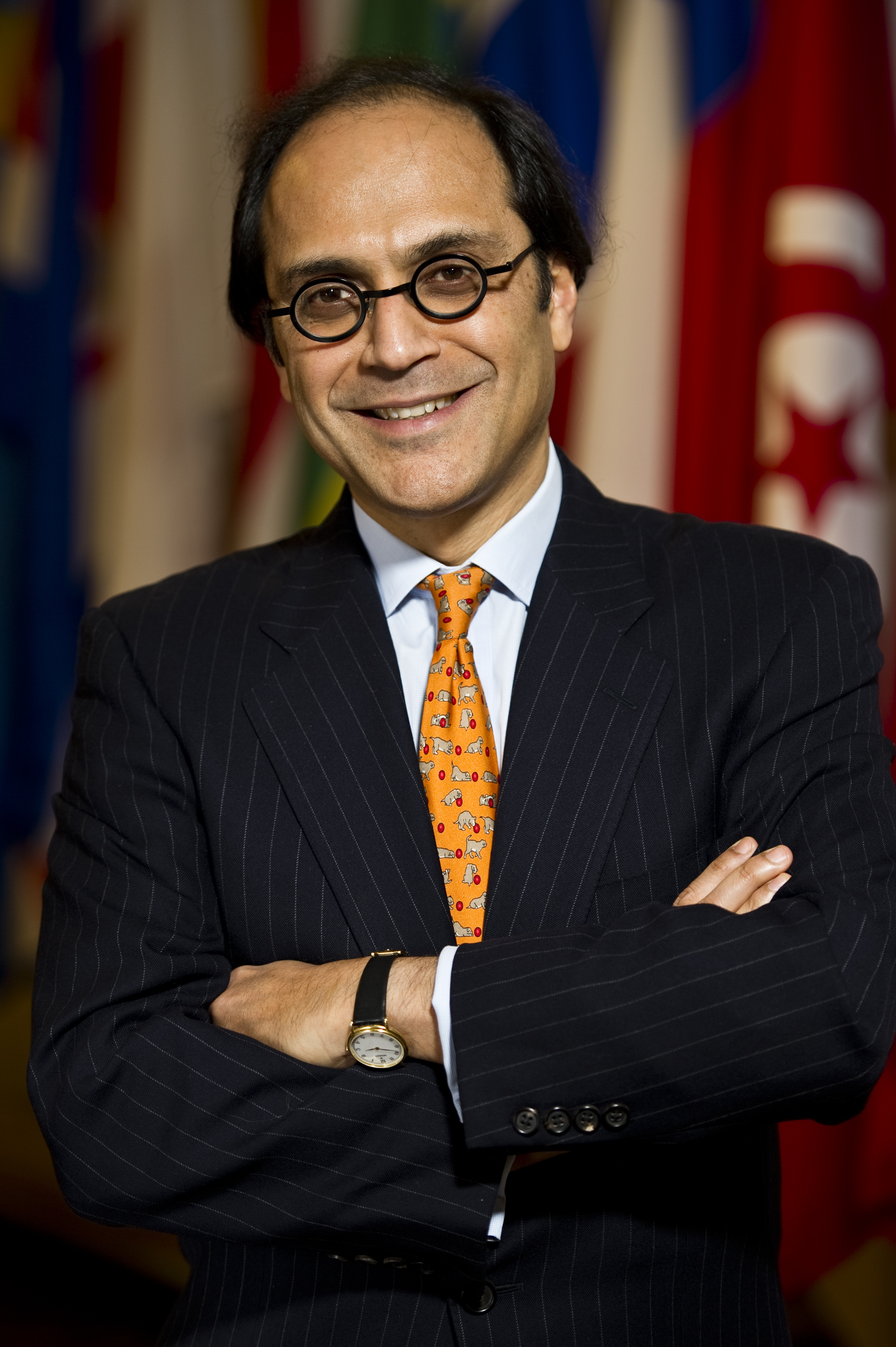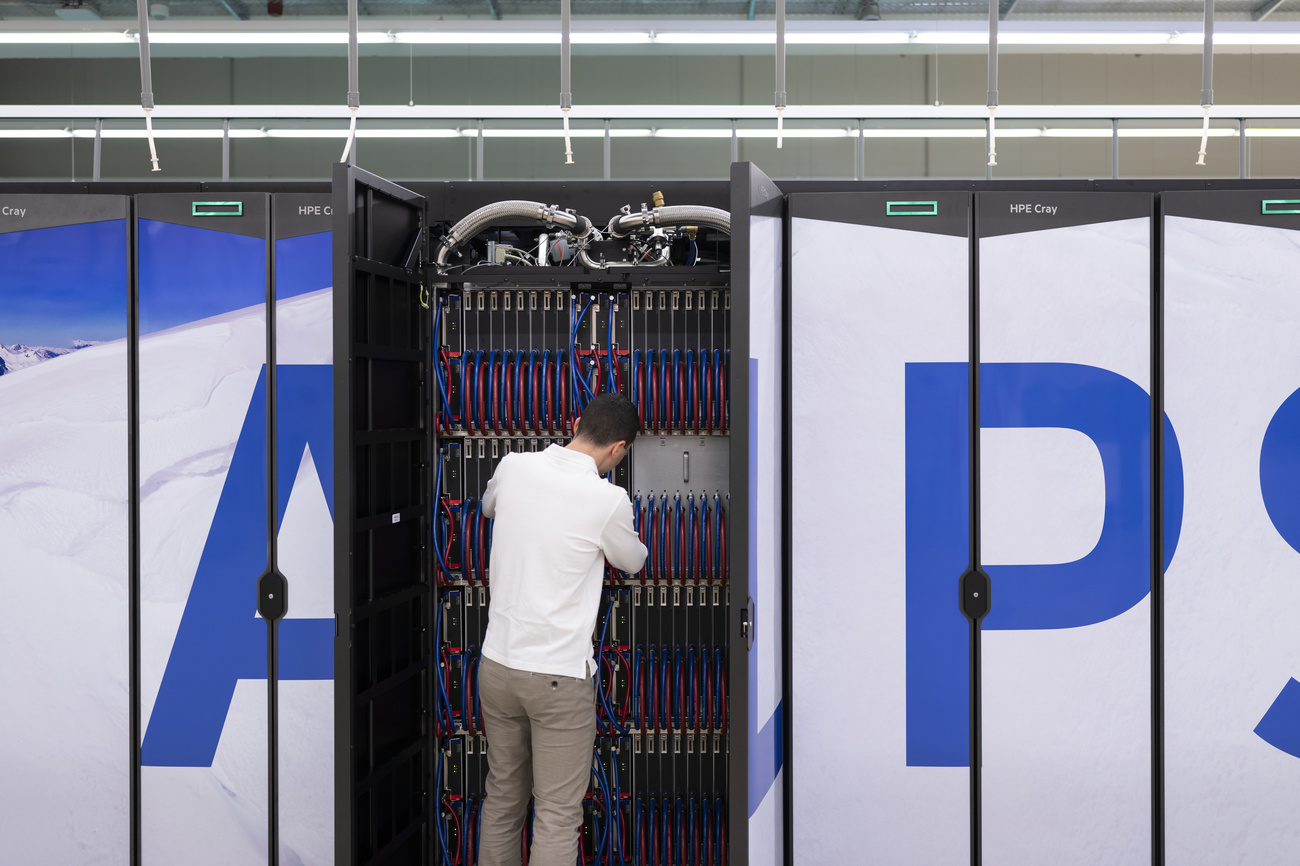China-US rivalry over artificial intelligence: what role for Switzerland?

AI expert Bhaskar Chakravorti analyses the growing rivalry between the US and China, the two technological superpowers, and Switzerland's possible role in a future increasingly dominated by artificial intelligence.
Artificial intelligence (AI) has become the new battleground between the US and China. With the launch of the chatbot DeepSeek – considered similar in performance to ChatGPT – China has shown that it can compete with American tech giants using fewer resources and greater efficiency, challenging American technological dominance.
Bhaskar Chakravorti, Dean of Global Business at Tufts University’s Fletcher School in Massachusetts (United States) and an expert on AI, explains the implications of this rivalry, the risk of geopolitical escalation, and the role that neutral countries like Switzerland could play in this increasingly complex scenario.
SWI swissinfo.ch: The level of rivalry between the US and China in the field of AI is very high after a Chinese start-up released DeepSeek. Was this to be expected?

Bhaskar Chakravorti: Yes, absolutely, many of the events that have taken place in the last few weeks are not that surprising. The reason is that whenever you start limiting certain resources [like computer chips], people become extremely creative and figure out how to do more with less. As they say, necessity is the mother of invention.
The recent development of DeepSeek did not come out of the blue: it is the result of behind-the-scenes work in China since 2023. The Chinese chatbot has demonstrated excellent performance at reduced costs, using less computing power and energy than American models.
This shows that despite the chip restrictions imposed by Biden on China and other countries, it is possible to create advanced AI systems without having access to state-of-the-art processors. This has challenged US supremacy.
>> Switzerland could also be excluded from the supply of advanced AI chips. Read more:

More
Switzerland caught in middle of US-China race for AI dominance
SWI: So has China proved to the world that it can really compete with the US in the race for AI dominance? By what means?
B.C: Yes, China has proven that it can be a strong competitor to the US by relying on open-source AI models and even piggybacking on proprietary models that will be used worldwide and its vast pool of talent and skilled engineers. The Chinese ecosystem also enjoys enormous state support.
The US technology industry will also be significantly supported by the state under the Trump administration: the president has already announcedExternal link investments in the development of artificial intelligence amounting to $500 billion. Trump is taking antagonism towards China to a new level.
SWI: Will we therefore see an escalation between China and the US when it comes to AI?
B.C: I think there will be an escalating competition for resources to develop AI systems, such as high-performance chips, supercomputers, cloud infrastructure, talent, and access to a whole range of data. We will see a kind of battle to exclude rivals from access to these resources.
What worries me is how much these capabilities will translate into military and national security uses, and how many guardrails can we ensure to protect data while enabling access, for instance to Chinese data in the US or US data in China. This increases global vulnerability, because these AI models, as we know, can also go so far as to perform malicious actions completely beyond our control.
And if the state is behind it, this scenario could get worse. In the West, we have always been taught not to trust the Chinese state. Now we have reached a point where we cannot even trust the American state. This is therefore a particularly dangerous situation, not only for the US and China, but for the whole world.
SWI: Do you see China in an advantageous position at the moment, having shown that it is possible to advance AI with fewer resources, less investment and fewer powerful chips?
B.C: Yes. China has shown that it has an efficiency advantage: with very few resources, it has managed to generate an artificial intelligence system comparable to expensive American models.
Moreover, China is further ahead in regulating AI than the US, where there is no organic national policy on the subject, but a confusing collage of laws in individual states. Congress has made no progress in this regard and, with the new administration, it is highly unlikely that we will see any advancement.
SWI: Can we trust systems developed under the regulations imposed by the authoritarian government in Beijing?
B.C: The problem is precisely this: the West does not trust Chinese policies and regulations. For example, it is not clear what data protection policies are in place, what systems are in place to prevent the Chinese government from interfering with the results of a particular model, what data is used and how it is stored.
Chinese systems therefore have many components that make people a little anxious and wary. We have seen this with the concerns about Chinese companies like Huawei having access to user data or, more recently, with the controversy in the US over TikTok. So China has a branding problem, and there are genuine reasons to be concerned.
On the other hand, if Chinese systems work just as well, while also being cheaper, people may still decide to adopt them. An example is, again, TikTok, which had 170 million users in the US. In the end, people are willing to use the technologies they find most interesting, regardless of where they were developed. So the race is on to play.
SWI: How does Switzerland fit into this picture? Why do you think the US government has excluded it from the list of trusted countries that can receive the most advanced chips without restriction?
B.C: I think the US administration has favoured countries aligned with their interests. Switzerland, not being in NATO and maintaining its neutrality, is seen as a country that could be equally friendly to the US as to China or any other nation.
For example, even India was excluded from this list for a very clear reason: its close ties with Russia. Besides it claims to be non-aligned. Swiss neutrality is of concern for similar reasons.
SWI: Precisely because of its neutrality, could Switzerland not play a mediating role in this technological war between West and East?
B.C: Yes, I think Switzerland can play a very important role. As I said, a critical factor is trust in the digital ecosystem. To build it, one approach would be to create a centre for trust in a country that can be trusted by the international community.
It is natural to consider Switzerland for this role because of its neutrality and its historical status as a country that hosts intergovernmental organisations such as the United Nations. Moreover, Switzerland already has a body to promote trust in the digital sphere. The Swiss Digital Initiative, has created a “Digital Trust Label”, a first-of-its-kind verification of trustworthiness of digital services.
>> Read how Switzerland created a Digital Trust Label to boost user confidence in new technologies:

More
How do you build trust in new technologies?
But it is not the only place that could fill this role. Singapore is a direct competitor, being a highly digitally advanced country, geographically close to both China and the United States. And other countries, particularly in the Middle East, could also have this aspiration. I am thinking for example of Dubai or the United Arab Emirates. Switzerland, therefore, is not the only candidate and has several competitors to contend with.
Edited by Veronica De Vore

In compliance with the JTI standards
More: SWI swissinfo.ch certified by the Journalism Trust Initiative












You can find an overview of ongoing debates with our journalists here . Please join us!
If you want to start a conversation about a topic raised in this article or want to report factual errors, email us at english@swissinfo.ch.